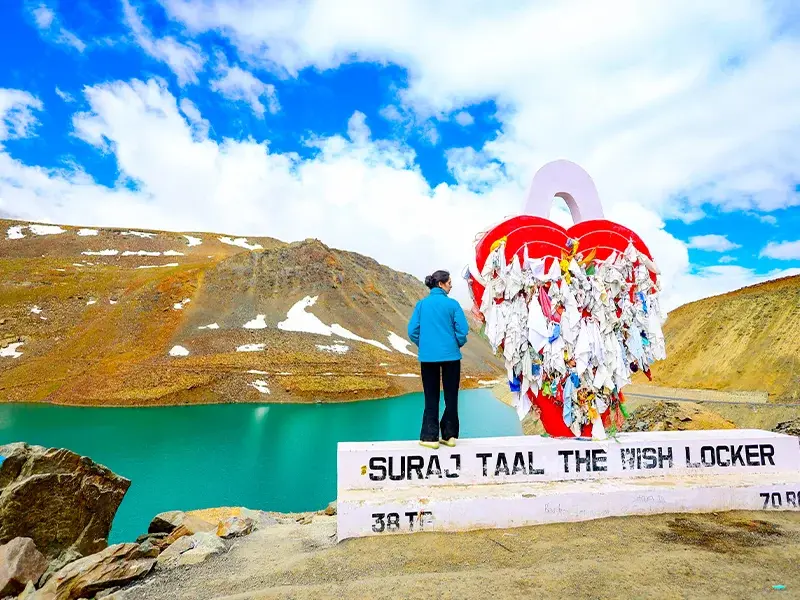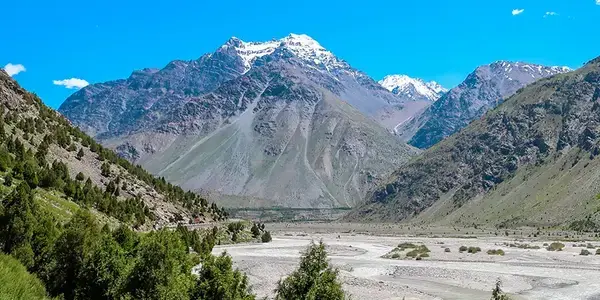


Suraj Tal, also known as “Lake of the Sun”, sits at a breathtaking altitude of around 16,000 feet, right below the Baralacha La pass in Himachal Pradesh. It is India’s third-highest lake and the origin of the Bhaga River, which later merges into the Chenab. The lake is revered by locals and pilgrims, who believe that a dip in its icy waters cleanses sins and purifies the soul.
In ancient times, nomads and travelers on the Ladakh–Himachal trade route would rest here, offering prayers for saf ...

Places To Visit In Lahaul Valley
Top places to visit in Lahaul Valley.
.webp)
Images Of Lahaul Valley
Experience Lahaul’s raw landscapes, mountains and villages through images
Places To Visit In Lahaul Valley
Images Of Lahaul Valley
High-Altitude Jackets
With strong winds and cold even in summer, carry waterproof jackets, thermal inners, and layers to stay warm at all times.
Windproof Gloves and Headgear
Frostbite can occur quickly at this altitude. Don’t forget gloves, caps, and mufflers.
Stay in Jispa/Keylong Before Visit
Acclimatization is necessary due to the lake's elevation. At least 1–2 nights at lower altitudes like Jispa is recommended.
Keep AMS Kit Ready
Carry Diamox, oxygen spray, painkillers, and hydration salts. Symptoms like headache and dizziness should not be ignored.
Short Walks Around the Lake
Depending on weather, you can take peaceful strolls around Suraj Tal to enjoy its color, silence, and stunning views.
Photography
The lake changes shades throughout the day—from silver-blue to turquoise green—ideal for wide-angle and reflection shots.
Offer a Silent Prayer
Many travelers pause here, not to shout or selfie—but to sit quietly, breathe, and soak in the sacred vibe.
No Food at the Lake
There are no dhabas or shops here. Carry snacks, warm beverages, and high-energy food if stopping for long.
Stop at Zing Zing Bar or Jispa
The nearest food stops are before or after the lake. Eat light to avoid nausea or discomfort at this altitude.
July to September is ideal when the lake is accessible.
Suraj Tal, also known as “Lake of the Sun”, sits at a breathtaking altitude of around 16,000 feet, right below the Baralacha La pass in Himachal Pradesh. It is India’s third-highest lake and the origin of the Bhaga River, which later merges into the Chenab. The lake is revered by locals and pilgrims, who believe that a dip in its icy waters cleanses sins and purifies the soul.
In ancient times, nomads and travelers on the Ladakh–Himachal trade route would rest here, offering prayers for safe passage across the Baralacha Pass. Over the years, Suraj Tal has remained less commercialized, retaining its raw and spiritual charm. While the lake is usually frozen during winter and spring, it transforms into a shimmering turquoise body during the summer months.
Due to its extreme elevation and challenging access, Suraj Tal is rarely crowded. It has become a silent favorite among adventurers, bikers, and photographers who seek solitude in the mountains. For those traversing the Leh–Manali Highway, Suraj Tal offers not just a scenic halt but a place of quiet reflection—where nature and faith merge in pure silence.
One of India’s Highest Lakes
Suraj Tal sits at approximately 16,000 ft and is the third-highest lake in the country, making it a unique geographical and spiritual destination.
Sacred in Local Belief
Many consider the lake holy. Locals believe that bathing in its waters cleanses karma and protects you from bad fortune.
Source of the Bhaga River
Suraj Tal is the origin point of the Bhaga River, which later joins the Chandra River to form the mighty Chenab.
Located Below Baralacha La
The lake lies just a few kilometers below the famous Baralacha La pass on the Leh–Manali Highway.
Glacial and Seasonal
Suraj Tal remains frozen for most of the year and is accessible only for a few months when the highway is open.
The Sun God's Gift
According to local legends, Suraj Tal was formed by Lord Surya (the Sun God) as a gift to the land of Lahaul. The name itself—Suraj Tal—means “Lake of the Sun.” People believe that Surya's divine energy blesses the lake, giving it purifying powers. Some pilgrims even collect its water to carry home for rituals. The lake's glow during sunrise further fuels this belief, as its surface reflects the sunlight like a giant golden mirror. Whether you're spiritual or not, the sacred atmosphere around Suraj Tal is something almost everyone feels.
The Quiet Vow of the Monk
It’s said that a monk from Keylong once meditated at Suraj Tal for seven days during late summer. He took a vow of silence and sat beside the lake, surviving only on water and dried fruits. His experience was so spiritually intense that he later built a small shrine in his village, dedicated to the "Voice of the Lake." Many believe the silence around Suraj Tal helps clear the mind and strengthen inner focus. Since then, some monks visit during brief windows in summer to meditate beside this sacred waterbody.
A valley is a low-lying area between hills or mountains, often formed by the erosion of water or glaciers. Valleys are characterized by their U-shaped or V-shaped profiles and can contain rivers, streams, and fertile land.